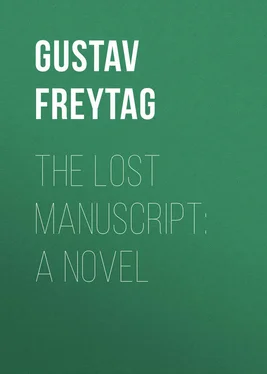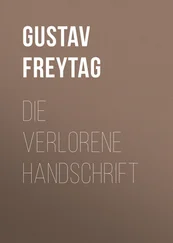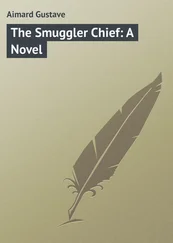Gustav Freytag - The Lost Manuscript - A Novel
Здесь есть возможность читать онлайн «Gustav Freytag - The Lost Manuscript - A Novel» — ознакомительный отрывок электронной книги совершенно бесплатно, а после прочтения отрывка купить полную версию. В некоторых случаях можно слушать аудио, скачать через торрент в формате fb2 и присутствует краткое содержание. Жанр: foreign_antique, foreign_prose, на английском языке. Описание произведения, (предисловие) а так же отзывы посетителей доступны на портале библиотеки ЛибКат.
- Название:The Lost Manuscript: A Novel
- Автор:
- Жанр:
- Год:неизвестен
- ISBN:нет данных
- Рейтинг книги:5 / 5. Голосов: 1
-
Избранное:Добавить в избранное
- Отзывы:
-
Ваша оценка:
- 100
- 1
- 2
- 3
- 4
- 5
The Lost Manuscript: A Novel: краткое содержание, описание и аннотация
Предлагаем к чтению аннотацию, описание, краткое содержание или предисловие (зависит от того, что написал сам автор книги «The Lost Manuscript: A Novel»). Если вы не нашли необходимую информацию о книге — напишите в комментариях, мы постараемся отыскать её.
The Lost Manuscript: A Novel — читать онлайн ознакомительный отрывок
Ниже представлен текст книги, разбитый по страницам. Система сохранения места последней прочитанной страницы, позволяет с удобством читать онлайн бесплатно книгу «The Lost Manuscript: A Novel», без необходимости каждый раз заново искать на чём Вы остановились. Поставьте закладку, и сможете в любой момент перейти на страницу, на которой закончили чтение.
Интервал:
Закладка:
"Then, Professor, I will answer you as candidly as you have spoken to me. I must not decline your proposal hastily. I will not oppose what may perhaps be for the happiness of my daughter. Yet I cannot, with the imperfect knowledge which I have of your position, assent to it. And I am at this moment in the awkward position of not knowing how I can obtain this knowledge."
"I can well understand how unsatisfactory to you must be any opinion concerning me which you may gather from strangers. Yet you will have to be content to do so," continued the Professor, with dignity.
The father assented silently.
"First," continued the Professor, "I beg to inform you concerning my pecuniary circumstances."
He mentioned his income, gave a faithful account of the sources from which he derived it, and laid a written statement on the writing-table.
"My legal adviser, who bears a high repute in the University, will give you any confirmation you may wish of these details. With respect to my capacity as teacher and my position at the University, I must refer you to the judgment of my colleagues and the opinion which is held concerning it in the city."
The Proprietor looked at the statement.
"Even the significance of these sums as regards your position is not quite clear to me. Having no acquaintance in your town, I have no facilities for obtaining further information concerning you. But, Professor, I will without delay endeavor to obtain all the information I can. I will start for the city of your residence to-morrow."
"How I thank you!" exclaimed the Professor, grasping his hand.
"Not yet," said the Proprietor, withdrawing it.
"I will, of course, if you like, accompany you," continued the Professor.
"I do not wish that," replied the Proprietor. "You need only write letters of introduction for me to your acquaintances. For the rest I must rely upon my own inquiries and on chance. But, Professor, this journey will only confirm your statements, of the truth of which I am already convinced. I may obtain the judgment of others concerning you, which will no doubt accord with mine. But let us suppose that the information is satisfactory to me, what will be the consequence?"
"That you will permit me to prolong my stay in your house," said the Professor; "that you will trustingly permit me to pay my addresses to your daughter; and that you will give your consent to our marriage as soon as I am certain of your daughter's affection."
"Such preliminaries to wooing are uncommon," said the father, with a saddened smile; "but they are not unwelcome to a farmer. We are accustomed to see fruits ripen slowly. Thus, Professor, after my journey we shall all three retain freedom of choice and a final decision. This conversation-shall it remain a secret?"
"I entreat you, yes," said the Professor.
Again a slight smile flitted over the grave countenance of the host.
"In order to make so sudden a journey less surprising you had better remain here. But, during my absence, refrain from any increase of intimacy with my daughter. You see what great confidence I place in you."
Thus the Professor had compelled his host to become the confidant of his love. It was a delightful compact between passion and conscience that the scholar had entered into, and yet there was an error in this arrangement. The agreement, which he had effected with eager spirit and beating heart, turned out a little different from the manner in which he had represented it to himself and to the father; for, between the three individuals who were now to enter upon this high-minded method of wooing, all easy intercourse had suddenly vanished. When Ilse, beaming with happiness, met the gentlemen on the morning of the eventful conversation, she found her heaven obscured and overshadowed with dark clouds. The Professor was uneasy and gloomy. He worked almost the whole day in his room, and when the little ones in the evening begged him to tell them some stories, he declined, took hold of the head of the little sister with both hands, kissed her forehead and laid his own head upon it as if he wished the child to support him. The words that he addressed to Ilse were few and constrained, and yet his eyes were fixed incessantly upon her, but inquiringly and doubtingly; and Ilse was surprised also at her father, who appeared absent-minded and sorrowful. A secret had arisen between her father and herself that deeply absorbed him; nay, even between the two men matters were not as they had been. Her father, indeed, spoke sometimes in a low voice to the friend, but she observed a constraint in both when they talked on indifferent subjects.
Then the next morning there was the secret journey of the father, which in few words he described as on unimportant business. Had everything changed about her since that eventful evening? Her heart beat anxiously. A sense of insecurity came over her-the fear of something direful that was to befall her. Sorrowfully she withdrew to her room, where she struggled with bitter thoughts and avoided being alone with the man she loved.
Of course the change became at once perceptible to the Professor, and it tortured the sensitive man. Did she wish to repel him in order not to abandon her father? Had that been only pleased astonishment which he had taken for affection of the heart? These anxieties made his demeanor constrained and unequal, and the change in his frame of mind reacted in turn upon Ilse.
She had joyfully opened the flower-bud of her soul to the rising light, but a drop of morning dew had fallen into it and the tender petals had closed again under the burden.
Ilse had acted as doctress and nurse to all who were ill or wounded on the estate. She had succeeded her mother in this honorable office; her fame in the district was considerable, and it was not an unnecessary accomplishment, for Rossau did not possess even one regular practitioner. Ilse knew how to apply her simple remedies admirably; even her father and the Inspectors submitted themselves obediently to her care. She had become so accustomed to the vocation of a Sister of Charity that it did not shock her maidenly feelings to sit by the sick-bed of a working man and she looked without prudery at a wound which had been caused by the kick of a horse or the cut of a scythe. Now the loved one was near her with his wound, not even keeping his arm in a sling, and she was fearful lest the injury should become greater. How glad she would have been to see the place and to have bandaged it herself! – and in the morning, at breakfast, she entreated him, pointing to his arm: "Will you not, for our sakes, do something for it?"
The Professor, embarrassed, drew his arm back and replied, "It is too insignificant."
She felt hurt and remained silent; but when he went to his room her anxiety became overpowering. She sent the charwoman, who was her trusty assistant in this art, with a commission to him, and enjoined her to enter with an air of decision and, overcoming any opposition of the gentleman, to examine the arm and report to her. When the honest woman said that she was sent by the young lady and that she must insist upon seeing the wound, the Professor, though hesitatingly, consented to show his arm. But when the messenger conveyed a doubtful report, and Ilse, who had been pacing restlessly up and down before the door, again ordered cold poultices through her deputy, the Professor would not apply them. He had good reason; for however painfully he felt the constraint that was imposed upon him in his intercourse with Ilse, yet he felt it would be insupportable entirely to lose sight of her and sit alone in his room with a basin of water. His rejection of her good counsel, however, grieved Ilse still more; for she feared the consequences, and, besides, it pained her that he would not accede to her wishes. When, afterwards, she learnt that he had secretly sent to Rossau for a surgeon, tears came into her eyes, for she considered it as a slight. She knew the pernicious remedies of the drunken quack and she was sure, that evil would result from it. She struggled with herself until evening; at last, anxiety for her beloved overcame all considerations, and when he was sitting with the children in the arbor, she, with anguish of heart and downcast eyes, thus entreated him: "This stranger will occasion you greater pain. I pray you, let me see the wound."
Читать дальшеИнтервал:
Закладка:
Похожие книги на «The Lost Manuscript: A Novel»
Представляем Вашему вниманию похожие книги на «The Lost Manuscript: A Novel» списком для выбора. Мы отобрали схожую по названию и смыслу литературу в надежде предоставить читателям больше вариантов отыскать новые, интересные, ещё непрочитанные произведения.
Обсуждение, отзывы о книге «The Lost Manuscript: A Novel» и просто собственные мнения читателей. Оставьте ваши комментарии, напишите, что Вы думаете о произведении, его смысле или главных героях. Укажите что конкретно понравилось, а что нет, и почему Вы так считаете.












